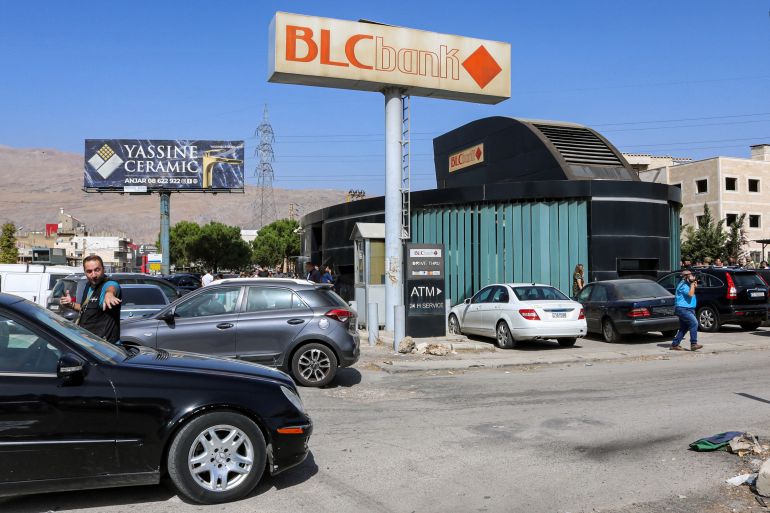Armed depositors hold up more banks in Lebanon over restrictions
The incident comes amid a wave of bank hold-ups as people grow frustrated over informal capital controls.

Outraged depositors, at least two of them armed, have stormed three commercial banks across Lebanon amid a wave of hold-ups triggered by a national financial meltdown.
On Tuesday morning, a Lebanese man armed with a pistol and a grenade entered the Chtaura branch of BLC Bank, demanding access to his $24,000 in savings, according to Depositors’ Outcry, a group campaigning for angry depositors.
Keep reading
list of 3 itemsTragedy off the coast of Lebanon, and protests in Iran
‘My life’s empty’: Father who lost family in Lebanon boat tragedy
The group said in a statement that the man, identified as Ali al-Saheli, is in debt and also needed to wire money to his son, who is studying in Ukraine.
“He had been trying to sell his kidney,” the statement said.
Similar incidents have been snowballing across Lebanon as the population grows more frustrated over informal capital controls that banks have imposed since an economic downturn began in 2019.
Security forces later entered the bank and arrested al-Saheli before he could access any money, the group said.
Also on Tuesday, a group of people employed at a state power station in Lebanon’s north stormed the First National Bank Branch in the port city of Tripoli, according to witnesses.
They were angry over delays in withdrawing their salaries, as well as fees they were being charged for the process, their union representative, Talal Hajer, told reporters outside the bank.
“These are depositors who are angry, whose deposits have been trapped in banks since late 2019 and these incidents continue despite tight security measures,” said Al Jazeera’s Zeina Khodr reporting from the Lebanese capital.
In a third incident, an armed depositor took hostages at Byblos Bank in the southern city of Tyre, according to the Depositors’ Association, another advocacy group.
It said he was carrying a pistol and demanding access to his savings, which amounted to $44,000.
There was no immediate comment from Byblos Bank.
On Monday, Lebanese depositor Zaher Khawaja and some associates managed to withdraw $11,750 from an account with more than $700,000 in it at the Haret Hreik branch of BLOM Bank.
BLOM said he was not armed and that it would look into the matter.
Last month, a spree of similar incidents saw the country’s banking association announce an approximately week-long closure.
Lebanese banks impose limits on the number of dollars a depositor can withdraw, no matter how much they have in the account.
To withdraw any more than the limit, the depositor must do so in local currency – but the rate at which banks exchange dollars for Lebanese pounds is far below the market value, meaning depositors lose considerable amounts of money every time they are forced to withdraw in local currency.
The Lebanese economy has been struggling since late 2019 in an economic meltdown described by the World Bank as one of the worst the world has witnessed since the 1850s.
The International Monetary Fund said last month the Lebanese government’s slowness to implement desperately needed reforms was exacerbating the country’s economic meltdown.
The IMF said Lebanon’s gross domestic product has contracted by more than 40 percent since 2018, inflation remains in the triple digits, foreign reserves are dwindling, and the parallel exchange rate hit new lows this week, reaching more than 38,000 Lebanese pounds to the dollar.
“When you talk to people you feel the frustrations,” Khodr said. “Unemployment is on the rise and there is a political class not showing any willingness to carry out the necessary reforms to fight corruption measures that need to be taken for this country to be eligible for an IMF bailout package.”
“So people feel that they have been paying the price for this financial crisis,” Khodr added.